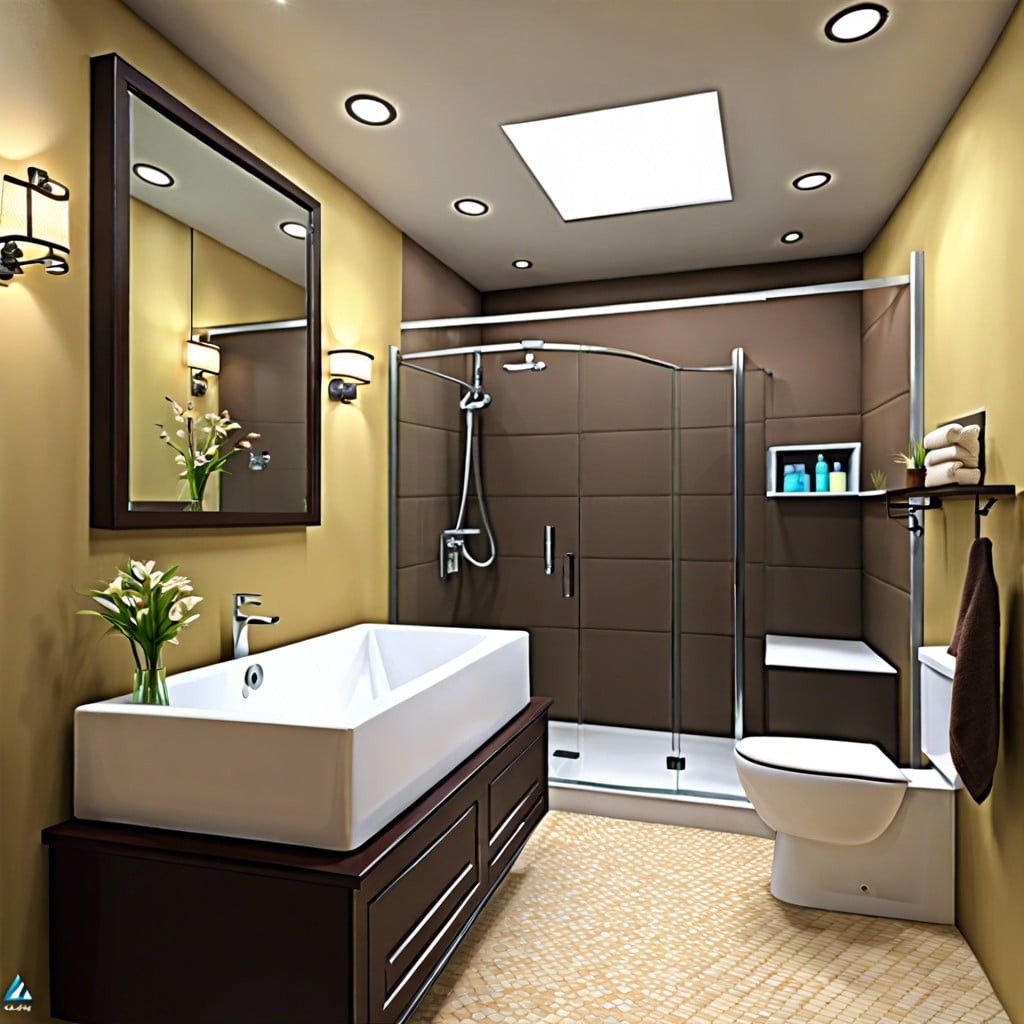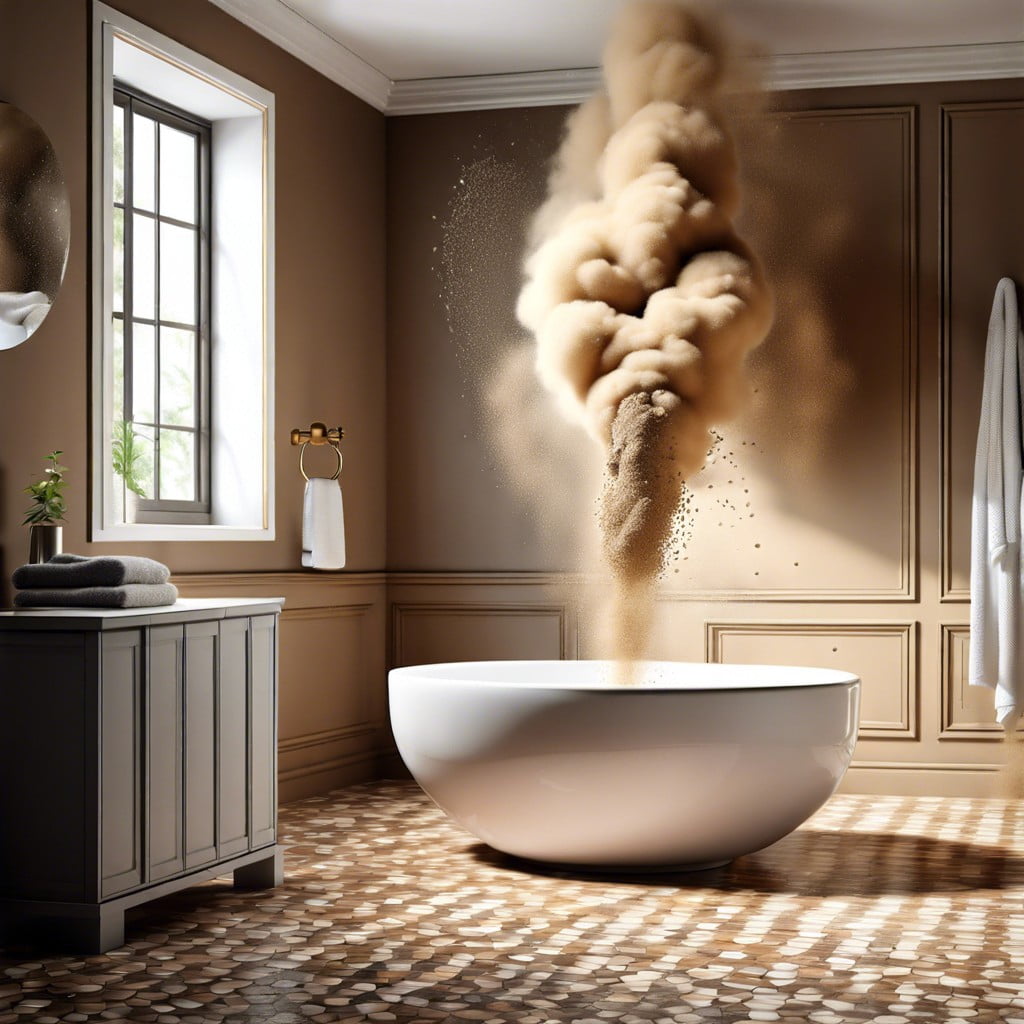Last updated on
Eliminating the foul pee smell in your bathroom becomes a breeze once you learn these practical tips and advice the article offers.
Key takeaways:
- Identify the source of the urine smell in your bathroom.
- Use enzymatic cleaners for effective odor removal.
- Regular and thorough cleaning of the toilet bowl.
- Deep clean bathroom drains to eliminate hidden smells.
- The significance of regular maintenance to prevent smell reoccurrence.
Identify the Source of the Urine Smell
When a bathroom reeks of urine, pinpointing the culprit is paramount. It might be as obvious as a misaimed stream or as subtle as splashes and drips around the base of the toilet. Don’t overlook porous grout lines which can harbor this unwelcome scent.
Keep in mind that the scent may also cling to fabric such as bath mats, or seep into unprotected wood surfaces. A thorough investigation beyond just the toilet – including checking for spills on floors, walls, and even ceilings in the case of an enthusiastic toddler or pet mishaps – is crucial for a successful deodorization crusade.
Once identified, targeted treatment can begin, paving the way for a fresher, more inviting space.
Use Enzymatic Cleaners for Effective Odor Removal
Enzymatic cleaners are the secret weapon in obliterating urine odors. These cleaners contain specific enzymes that break down the urine molecules that cause the stench, instead of just masking the smell.
They are particularly effective because they tackle the root of the problem: the uric acid crystals that typical bathroom cleaners can’t completely dissolve.
To use, apply the cleaner generously to the affected area, let it sit as per the instructions—patience is key here for the enzymes to work their magic—then scrub and rinse.
Beyond just the toilet area, consider targeting floors, walls, and even grout, as unseen splashes can contribute to the lingering smells.
Remember to read labels and use as directed, since different surfaces may require different treatments.
Enzymatic cleaners not only offer a one-time fix but can help keep your bathroom fresh with routine use.
Regular and Thorough Cleaning of the Toilet Bowl
In maintaining a fresh bathroom, attention to the toilet bowl is crucial. An often-overlooked fact is that odors can permeate porous surfaces; thus, a clean-looking toilet is not always odor-free. To combat this, a routine involving both daily and weekly tasks is recommended.
Daily swipes with a toilet brush can dislodge fresh deposits, preventing the accumulation of odor-causing residue.
For a more in-depth cleaning, opt for a weekly application of a disinfecting cleaner, allowing it to sit and penetrate grime before scrubbing. This not only sanitizes but also tackles any persistent smells. Don’t ignore the oft-forgotten areas: the underside of the seat and the rim need regular attention, as urine can splatter and linger in these hidden spots.
Lastly, consider the role of toilet fresheners; while not a stand-alone solution, they can aid in keeping the bowl smelling pleasant between cleanings. Remember, consistency is more effective than occasional deep cleans, so make these practices part of your routine for a continually fresh-smelling bathroom.
Deep Clean Bathroom Drains to Eliminate Hidden Smells
Often underestimated in the battle against bathroom odors are the drains. Residual urine can seep into these unseen areas, festering and contributing to the unwelcome aroma.
To tackle this, start with a simple boiling water flush to loosen debris. Follow with a mixture of baking soda and vinegar, nature’s champions of deodorization and cleansing, to break down organic matter.
Allow the concoction to work its magic for about an hour before rinsing again with hot water. For maintenance, regularly pouring a cup of bleach followed by boiling water can provide a more aggressive approach to keeping drain smells at bay.
Remember, the aim is to ensure that all parts of the bathroom, visible or not, contribute to a fresh and clean atmosphere.
The Significance of Regular Maintenance to Prevent Smell Reoccurrence
Maintaining a fresh bathroom is akin to tending a garden; it thrives with regular attention. Neglect allows foul odors to creep back.
Here are key maintenance strategies:
- Schedule weekly deep cleans, focusing on the toilet area, to combat lingering odors.
- Incorporate daily wipe-downs of surfaces, especially if your household includes young children or individuals with incontinence issues.
- Refresh drains monthly with baking soda and vinegar to prevent odor build-up from organic material.
- Replace or wash regularly any fabric, such as bathmats or towels, which can harbor urine smells.
- Keep your cleaning supplies stocked and accessible to encourage prompt clean-up of any accidents.
FAQ
How do you get rid of urine smell in bathroom?
To effectively eliminate urine smell in the bathroom, use bleach as it can breakdown the stubborn organic compounds causing the unpleasant odor.
Why does my bathroom smell like urine even after cleaning?
The persistent urine smell in your bathroom even after cleaning could be due to unattended urine residue accumulated under the toilet rim and on the bowl’s surface, which keeps releasing foul odors.
What neutralizes the smell of urine?
A powerful remedy to neutralize urine smell can be created by mixing together 8 fluid ounces of peroxide, 3 tablespoons of baking soda, and a few drops of dish detergent.
How do I get rid of a strong urine smell in my room?
To eliminate a strong urine smell in your room, one effective method is to use a mixture of water, baking soda, and a few drops of your preferred essential oil in a spray bottle and apply it to the affected areas.
What are the most effective natural remedies to eliminate urine odor in bathrooms?
Baking soda, vinegar, hydrogen peroxide and essential oils are among the most effective natural remedies to eliminate urine odor in bathrooms.
Can the type of floor surface influence urine smell persistence in the bathroom?
Yes, the type of floor surface can significantly influence the persistence of urine smell in the bathroom due to different materials’ absorbency levels and ease of cleaning.
How does humidity and ventilation affect the lingering of urine odors in bathrooms?
High humidity levels and poor ventilation in bathrooms can exacerbate urine odors by allowing them to linger and intensify due to the prevention of quick evaporation and fresh air circulation.
Recap




